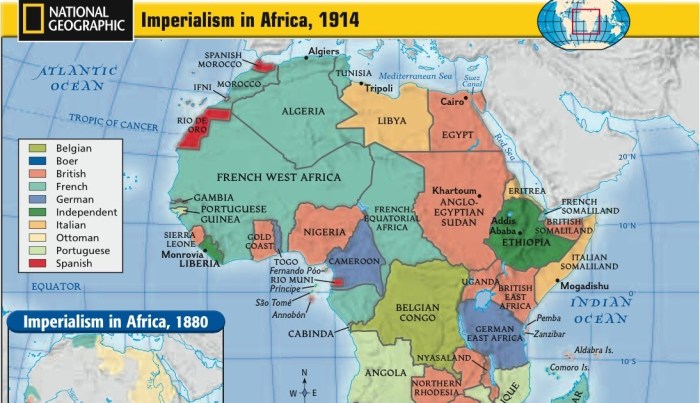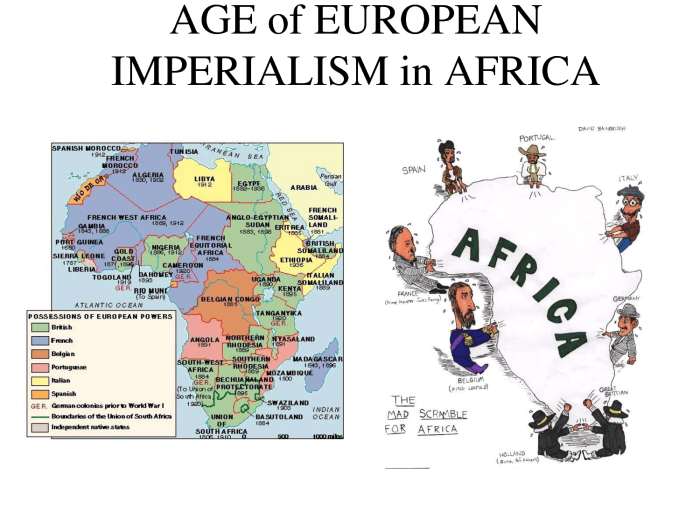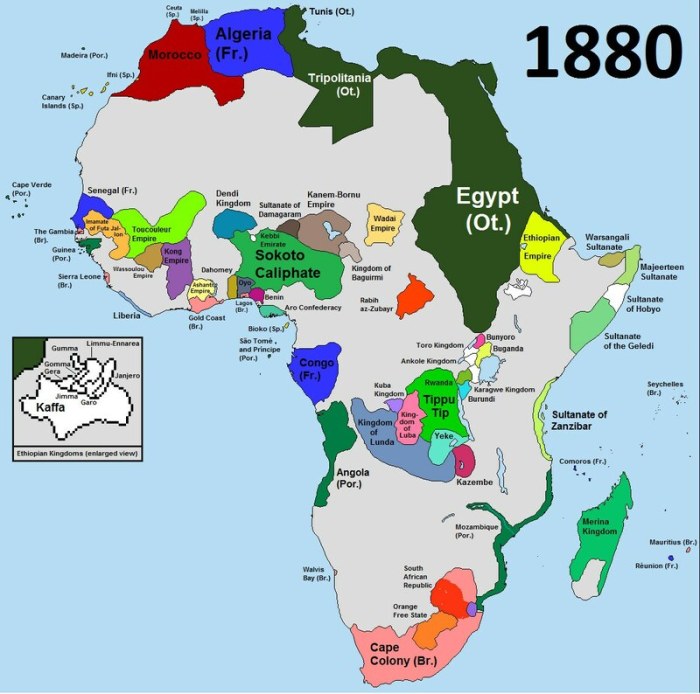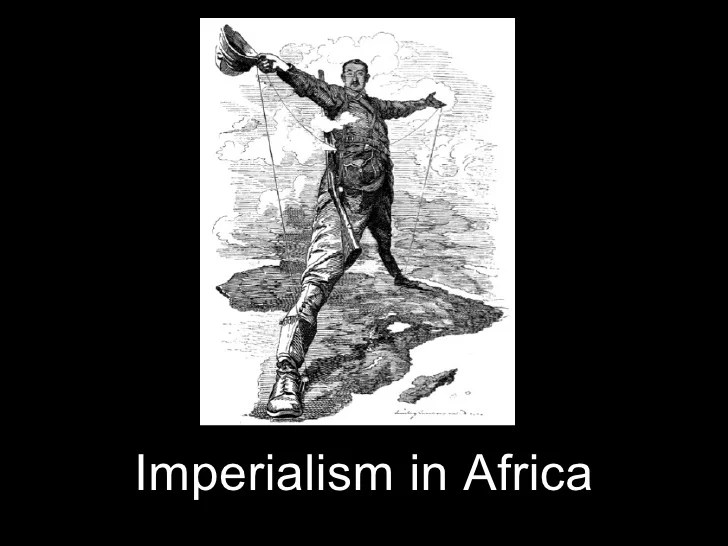Imperialism in africa mini q – Imperialism in Africa: A Mini Guide to Its Impact and Legacy is an accessible and concise overview of the complex history of European colonialism in Africa. It explores the motivations, methods, and consequences of imperialism, providing a comprehensive understanding of its profound impact on African societies and the continent’s development.
This guide delves into the various forms of resistance to colonial rule, the long-term effects of imperialism on African nations, and its continuing influence on contemporary issues in Africa. Through engaging narratives and clear explanations, this guide offers a valuable resource for students, researchers, and anyone interested in understanding the complexities of imperialism in Africa.
Overview of Imperialism in Africa

Imperialism refers to the extension of a nation’s authority by territorial acquisition or by establishing economic and political dominance over other regions. European imperialism in Africa began in the late 19th century and had a profound impact on the continent’s history, societies, and economies.
The major European powers involved in imperialism in Africa included Britain, France, Germany, Portugal, Italy, Spain, and Belgium. These countries sought to expand their empires, access raw materials, establish new markets, and gain political influence.
Motives and Justifications for European Expansion into Africa
The motives for European expansion into Africa were complex and varied. Some of the key factors included:
- Economic motives:The desire to access new sources of raw materials, such as gold, diamonds, rubber, and ivory, as well as to establish new markets for European goods.
- Political motives:The desire to gain political influence and control over territories, as well as to secure strategic military positions.
- Ideological motives:The belief in the superiority of European civilization and the desire to “civilize” and “modernize” Africa.
- Social motives:The desire to find new opportunities for European settlers and to relieve population pressures at home.
Methods of Imperial Control

European powers employed various methods to establish and maintain control over African territories. These included:
Military conquest:European powers used military force to subdue African kingdoms and establish colonial rule. This involved deploying troops, establishing military bases, and suppressing resistance.
Economic exploitation:European powers exploited African resources and labor to fuel their own economies. This included establishing plantations, mines, and trading companies that extracted raw materials and cash crops from Africa.
Political domination:European powers imposed their own political systems and laws on African territories. This included establishing colonial administrations, appointing European officials, and suppressing African political and cultural institutions.
Specific Policies and Practices
Specific policies and practices used to implement imperial control included:
- Indirect rule:A system where European powers ruled through existing African political structures, appointing local rulers as intermediaries.
- Assimilation:A policy aimed at integrating African elites into European society and culture.
- Segregation:A policy that separated Africans from Europeans in social, economic, and political spheres.
- Forced labor:A system where African workers were compelled to work on European plantations, mines, and other enterprises.
- Taxation:European powers imposed taxes on Africans to generate revenue and control the economy.
These methods and policies enabled European powers to establish and maintain control over vast territories in Africa, shaping the political, economic, and social landscape of the continent for centuries to come.
Economic Impact of Imperialism: Imperialism In Africa Mini Q
Imperialism in Africa had a profound impact on its economies. The European powers exploited the continent’s natural resources, imposed forced labor, and disrupted traditional economic systems, leading to economic inequality and underdevelopment.
Exploitation of Natural Resources
The European powers seized control of Africa’s vast natural resources, including minerals, timber, and agricultural products. They established plantations and mines, using forced labor to extract these resources and export them to Europe.
Forced Labor
Forced labor was widespread in imperial Africa. African workers were compelled to work on plantations, mines, and other European-owned enterprises under harsh conditions and for minimal pay. This system robbed Africans of their freedom and stifled their economic development.
Disruption of Traditional Economic Systems, Imperialism in africa mini q
Imperialism disrupted traditional African economic systems, which were based on subsistence farming, trade, and crafts. The introduction of cash crops and wage labor forced Africans to abandon their traditional livelihoods and become dependent on the colonial economy.
Economic Inequality and Underdevelopment
Imperialism led to severe economic inequality in Africa. The European powers accumulated wealth and power at the expense of the African population. The exploitation of resources and forced labor prevented Africans from developing their own economies and left them in a state of underdevelopment.
Social and Cultural Impact of Imperialism

Imperialism brought profound social and cultural transformations to Africa. The introduction of new technologies, the spread of Christianity, and the disruption of traditional cultural practices left a lasting impact on African societies.
Introduction of New Technologies
European colonizers introduced a range of technologies to Africa, including firearms, steam engines, and telegraphs. These technologies had both positive and negative effects. On the one hand, they facilitated communication, transportation, and economic development. On the other hand, they also disrupted traditional ways of life and contributed to the displacement of indigenous populations.
Spread of Christianity
Missionaries played a significant role in the spread of Christianity in Africa. Christian missionaries established schools, hospitals, and churches, which provided access to education, healthcare, and spiritual guidance for many Africans. However, the spread of Christianity also led to the suppression of traditional African religions and cultural practices.
Disruption of Traditional Cultural Practices
Imperialism disrupted traditional African cultural practices in many ways. Colonizers imposed their own laws, customs, and values on African societies, leading to the erosion of traditional political systems, social structures, and religious beliefs. This disruption had a profound impact on African identities and social structures.
Resistance to Imperialism

Imperialism in Africa faced widespread resistance from African leaders and movements who fought to maintain their sovereignty and independence. These resistance efforts took various forms and employed diverse strategies.
The motivations for resistance were multifaceted, including the desire to preserve cultural identity, protect land and resources, and regain political autonomy. African leaders and movements adopted various strategies, such as armed uprisings, diplomatic negotiations, and cultural and economic boycotts.
Armed Resistance
Armed resistance was a common form of resistance to imperial rule. African leaders and warriors led rebellions and fought pitched battles against colonial forces. Some notable examples include the Ashanti Wars in Ghana, the Zulu Wars in South Africa, and the Mahdist War in Sudan.
- Ashanti Wars:The Ashanti Confederacy in present-day Ghana resisted British expansion in a series of wars from 1824 to 1901. Led by skilled military leaders, the Ashanti employed guerrilla tactics and advanced weaponry to challenge British forces.
- Zulu Wars:The Zulu Kingdom in South Africa resisted British encroachment during the Anglo-Zulu Wars of 1879 and 1880. The Zulu army, known for its discipline and use of the “impi” (buffalo horn) formation, inflicted heavy casualties on British troops.
- Mahdist War:In Sudan, the Mahdist movement led by Muhammad Ahmad ibn Abd Allah launched a revolt against Egyptian and British rule from 1881 to 1898. The Mahdists established an independent state in Sudan but were eventually defeated by British forces.
Diplomatic Resistance
African leaders also employed diplomatic resistance to oppose imperial rule. They sent delegations to Europe to protest colonial policies and negotiate for better terms. Some African leaders, such as King Leopold II of the Congo Free State, used international diplomacy to gain recognition for their territories while exploiting their resources.
Imperialism in Africa left a lasting impact on the continent. If you’re interested in delving deeper into this topic, check out the unit 9 progress check frq . This resource provides valuable insights into the effects of imperialism and its consequences for African nations.
Continuing to explore the topic of imperialism in Africa mini q will help you gain a comprehensive understanding of this complex historical event.
- Ethiopian Diplomacy:Emperor Menelik II of Ethiopia successfully negotiated with European powers to maintain Ethiopia’s independence during the Scramble for Africa. He modernized the Ethiopian army and played European powers against each other to secure his country’s sovereignty.
- Pan-African Movement:In the early 20th century, the Pan-African Movement emerged as a platform for African leaders to advocate for self-determination and unity. They held conferences and lobbied international organizations to raise awareness about the plight of African people under colonial rule.
Cultural and Economic Resistance
In addition to armed and diplomatic resistance, Africans also employed cultural and economic resistance to challenge imperial rule. They refused to adopt European customs and languages, maintained traditional practices, and organized boycotts of European goods.
- Cultural Preservation:African societies preserved their cultural heritage by practicing traditional rituals, music, and art. They resisted the imposition of European education and religious beliefs, maintaining their own systems of knowledge and spirituality.
- Economic Boycotts:In some cases, Africans organized boycotts of European goods to protest colonial policies. For example, in Nigeria, the boycott of British cotton goods in the 1930s was a major act of economic resistance.
Legacy of Imperialism in Africa

The legacy of imperialism in Africa is complex and far-reaching, with both positive and negative effects. The long-term impacts of colonial rule have shaped the political, economic, and social landscape of the continent, and continue to influence contemporary issues in Africa.
One of the most significant legacies of imperialism is the establishment of arbitrary borders that divided ethnic groups and created new nations with little regard for cultural or historical boundaries. This has led to conflicts and tensions between different groups, as well as challenges in nation-building and economic development.
Political Challenges
The political challenges faced by African nations in the post-colonial era include:
- Weak institutions:Many African countries inherited weak and unstable political institutions from their colonial rulers, which have struggled to provide effective governance and stability.
- Authoritarianism:Imperialism often fostered authoritarian rule in Africa, and many post-colonial governments have struggled to establish democratic systems.
- Corruption:Corruption is a major problem in many African countries, which undermines governance and economic development.
Economic Challenges
The economic challenges faced by African nations in the post-colonial era include:
- Dependency on raw materials:Many African economies remain heavily dependent on the export of raw materials, which makes them vulnerable to fluctuations in global prices.
- Lack of industrialization:Imperialism often stifled industrialization in Africa, and many countries continue to struggle to develop their manufacturing sectors.
- Poverty and inequality:Poverty and inequality are widespread in Africa, and many countries face challenges in providing basic services to their populations.
Social and Cultural Challenges
The social and cultural challenges faced by African nations in the post-colonial era include:
- Ethnic conflict:The arbitrary borders imposed by imperialism have often led to ethnic conflict and tensions.
- Cultural assimilation:Imperialism often led to the suppression of African cultures and the imposition of European values and norms.
- Brain drain:Many African countries face a brain drain, as skilled workers and professionals leave to seek opportunities in other countries.
FAQs
What were the main motives for European imperialism in Africa?
Economic exploitation, political control, and the desire to spread Christianity were the primary motivations for European imperialism in Africa.
How did imperialism impact African economies?
Imperialism led to the exploitation of natural resources, forced labor, and the disruption of traditional economic systems, resulting in economic inequality and underdevelopment in Africa.
What were the different forms of resistance to imperialism in Africa?
Resistance to imperialism took various forms, including armed rebellions, nonviolent protests, and cultural and intellectual resistance.